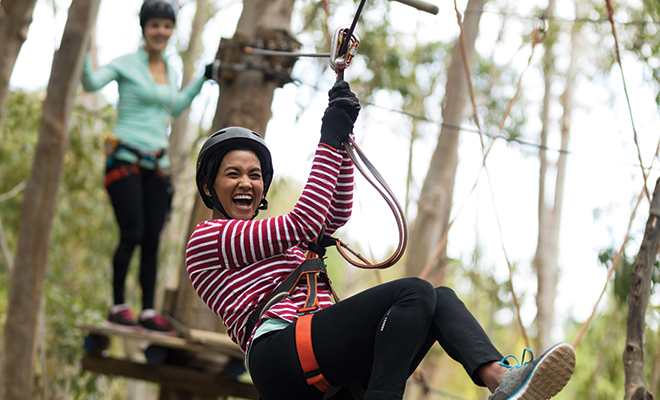
Coping after Breast Cancer: Adventures in Exercise
When a woman hears the words, “You have breast cancer,” a myriad of thoughts and fears can flash through her mind. The last thing she may be thinking about is exercise, although it can play a vital role during treatment and recovery.
A recent study found that women who exercised at a moderate intensity 20 minutes a day before and after being diagnosed with breast cancer had a 55 percent lower risk of recurrence compared to women who didn’t. Even women who started exercising only after they finished treatment showed benefits such as a 46 percent lower risk of recurrence and a 43 percent lower risk of dying compared to women who were not exercising regularly.
But health and wellbeing may look different after breast cancer. Instead of taking yoga classes or doing a more traditional workout at the gym, survivors may seek unique exercise experiences. Here are a few ways some women are adding a little more adventure to their lives.
Weekends and Retreats
The idea is pretty simple, but it can provide loads of support and diverse exercise in one weekend. A small group of women with breast cancer, whether in treatment or not, come together at an outdoor camp, sharing a weekend of group nurturing, participating in ropes courses, teambuilding exercises, kayaking, yoga, snowshoeing, hiking and other activities. One organization in Colorado, Epic Experience, provides free, week-long adventure camps for adult cancer survivors and thrivers. Adult patients at any state of their cancer journey can apply online. Camps are offered in winter and summer months so the variety of activities is endless.
Dancing it Out!
Strengthening the body while lightening the soul, dancing has been shown to improve quality of life, speed recovery time, enhance survivorship and reduce the chances of recurrence. A study by the National Institutes of Health revealed that patients undergoing cancer treatment, as well as their partners, benefited from ballroom dancing. In addition, the increase in socialization for women who may have felt isolated during the various stages of their treatment and recovery was substantial to their mental health.
MOVING FOR LIFE DanceExercise for Health® is just one group that dedicates its practice to patients affected by cancer. They offer free and low-cost dance exercise classes in hospitals, health and wellness centers, libraries and other community-based sites. Classes are specially designed to address the effects of cancer treatment such as radiation, chemotherapy and surgery.
Free Fall!
A skydive is one of the most unforgettable ways to celebrate an achievement, and some women prefer to take to the skies to commemorate winning the battle with cancer, or even just managing their journey. Many say that nothing can beat the adrenaline rush of flying through the clouds at speeds of 120 miles per hour and, at 10,000 feet above the earth, the sensation can be just the lift a survivor needs for more confidence, and optimism, not to mention a big thrill.
Zip Lining
While not considered quite as exhilarating as sky diving, zip lining can give a rare adrenaline rush with beautiful views from new heights! Ziplining can help patients reduce stress and anxiety and provide a sense of accomplishment. One Canadian organization hosts Bare in the Air, a naked zip lining event to raise money for breast cancer research. How’s that for getting over your fears?
Finding the Right Adventure
Staying active helps to keep the body and mind resilient before, during and after a cancer diagnosis, but choosing a more thrilling activity is a major decision. Patients should speak with their doctor about exercise and activities that are appropriate for them.
Find What You Like
It may be difficult to figure out which kind of exercise you’re most likely to enjoy. Read and research until you’ve found your top choices. If you prefer the buddy system, enlist a family member or friend to join you.
Take Precautions
It is important to use basic safeguards while exercising, especially if you are having side effects from cancer or its treatment. Be sure to talk to the business owner or instructor before your adventure and let them know that you’re a breast cancer survivor. Tell them what you can and can’t do and ask for modifications if needed.
Know When to Stop or Change
If you experience symptoms such as shortness of breath or chest pain before or during your activity, stop. Also, speak with your doctor about other ways to stay active.
Having breast cancer can change a woman’s life and her perspective on it. Doing new and stimulating things is one way to tackle the challenges, both past and present. Adventurous exercise can help cancer survivors see themselves in a new light, or at least a brighter one for the days to come. ■
Sources: breastcancer.org, yourcancerstory.com and movingforlife.org.







